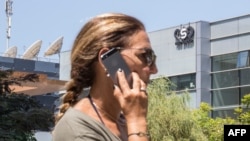The U.N. high commissioner for human rights has issued a warning about the misuse of surveillance technology in the wake of reports spyware was used to hack smartphones of human rights activists, business executives and journalists. Michelle Bachelet says the illegitimate use of the tools could undermine people’s human rights and subvert democratic societies.
It is not yet clear to what extent the Pegasus spyware developed and sold by the Israeli firm NSO Group has been used to spy on journalists, human rights defenders, opposition politicians and others. But Bachelet finds revelations that the telephones of some 50,000 people were hacked into extremely alarming.
The high commissioner’s spokesman, Rupert Colville, calls the emerging information hugely disturbing and notes it may just be the tip of the iceberg. He told VOA the people whose phones were hacked are not Islamic State terrorists or criminals. He said they are journalists, human rights activists and others engaged in legitimate activities.
“It is very scary. The potential is very severe and, I think a wake-up call to everyone that we need to do something about this. We need to find some way of controlling this. Putting this genie back into the bottle because it is potentially hugely intrusive and hugely dangerous in some cases for many of us,” Colville said.
In a statement, Bachelet expressed her misgivings about the use of these deeply intrusive surveillance tools. She said they can only be justified in cases of investigations in serious crimes and grave security threats.
She noted if the recent allegations about the use of the spyware are even partly true, then that red line has been crossed again and again with total impunity.
Colville said the surveillance tools reportedly have been used to arrest, intimidate, and even kill journalists and human rights defenders. He said the potential for abuse of the Pegasus sofware, is huge and very dangerous.
“You can get people who are simply spying on any politician, on any kind of opposition whatsoever in order to stay in power. And that, of course is perhaps the most alarming thing overall. It can be used to subvert democracy, to subvert all sorts of human rights—freedom of expression, freedom of opinion, right to privacy and, in extreme cases, right to life,” Colville said.
Bachelet said companies that develop and distribute surveillance technologies are responsible for avoiding harm to human rights. She said they must take immediate steps to mitigate and remedy the harms caused by their products.
Bachelet said that countries need to enact laws to make companies legally accountable for the illegitimate use of their technology. She added that measures urgently need to be put in place to better regulate the sale, transfer, and use of surveillance technology to ensure it complies with human rights law.




